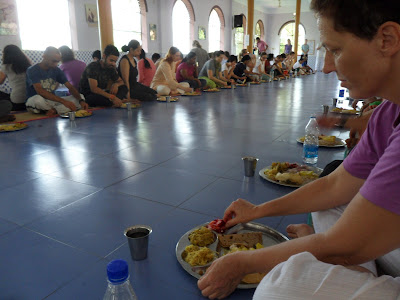Many of you might be wondering what's happening to me and why I've not updated my posts in the last few months. Before looking for another teaching contract, I decided to take the next half of the year off for travel (you can follow my travels here) and to continue my personal studies.
Just because I've momentarily taken a hiatus from teaching English doesn't mean the teaching and learning has to end. Traveling through Asia and SEA is a learner's goldmine! There are many schools
and certifications you can get at a much cheaper price than the U.S. It's something to take advantage of.
Yoga is one of my loves and something I find spiritually, physically and mentally valuable to my life. There are times, I think studying yoga is more important to me than my master's degree for the type of inspiration and wholistic healing it brings. Thus, spending time in a real Indian yoga ashram (read here) and getting my yoga teacher's certification in India (read here) were things at the top of my bucket list.
I spent a week at the Sivananda Yoga School in Neyyar Damn, Trivanandrum, India and it was very rewarding experience. Yoga enthusiasts from all over the world come here to practice yoga, to train as teachers and to take various ayurvedic treatments and certificate trainings. I even met up with some fellow English teachers from Daegu!
I took a local bus ride to Neyyar Dam from the Trivandrum station. Neyyar Dam is on the outskirts of Trivandrum and is part of a wildlife sanctuary park. At night I'd find myself lulled to sleep by the
echo of humping tigers residing across the lake at the Tiger Sanctuary.

The ashram/school is large with several dorms, shala space, dining hall, ayurvedic center, meditation halls, snack bar/gift shop... the works! And the park surrounding it offers peaceful solace and removal from everyday Indian hubub (and lets face it... in the cities, it's pretty noisy).
The yoga ashram program was a full and intensive schedule. Two yoga classes a day, meditation sessions in the morning and evening, satsang chanting, philosophy classes, ayurveda classes, Indian rituals, karma yoga and occasional events.
For instance, while I was there it was Holi Festival. While we weren't able to leave the ashram grounds to go into the city, the ashram put on it's own Holi event near the lake!
It was a chance for me to learn more about Indian culture and philosophy vs. the white-washed notions of the West. Invaluable, was the experiential factor of celebrating aarti (prayer/worship rituals), festivals, practicing an ayurvedic lifestyle and eating Indian style.

Recieving prassad after an aarti cermeony
Two main reasons to study abroad:
1. Experiential learning
There's an experiential aspect to learning abroad, which we don't always assess enough credit to when we think about schooling outside of our own country. Abroad, we learn through the osmosis of environment, food, lifestyle, language, it's belief and it's intuitive understanding. The latter sounds cryptic and new agey, but we forget that even as children, we learn through intuitive sense.
2. Cultural learning
Studying abroad (especially in India where yoga originates) the environment really took on a large role in sculpting and enlivening my sensibilities for my practice. Understanding Indian culture, helps you to understand the discipline of learning.
If you've ever been to India, you'll come to see how much the "spiritual" aspect of life takes priority in everyday ritual. For India, worship perfumes the air everywhere you go... neighborhood/home altars, you'll hear priest chanting satsang over loudspeakers in the direction of temples in the morning and evenings and there is always a lining of incense to waft of your day. The concentrated western belief and practice of yoga is primarily physical. Westerners think of yoga as enhancing physiques, getting a good workout, measuring our body's flexibility and occasionally, training the mind to focus on peace (aka meditation).
Interesting huh?
To read about my experience with ashram life, click on this post.












Hey..
ReplyDeleteYou can look many different collection in this site. Not just this album its a really very nice pics. They also have an album about Yoga Ashram India, Schools in many place. I like to check all the activity they have.
Thanks too!!!